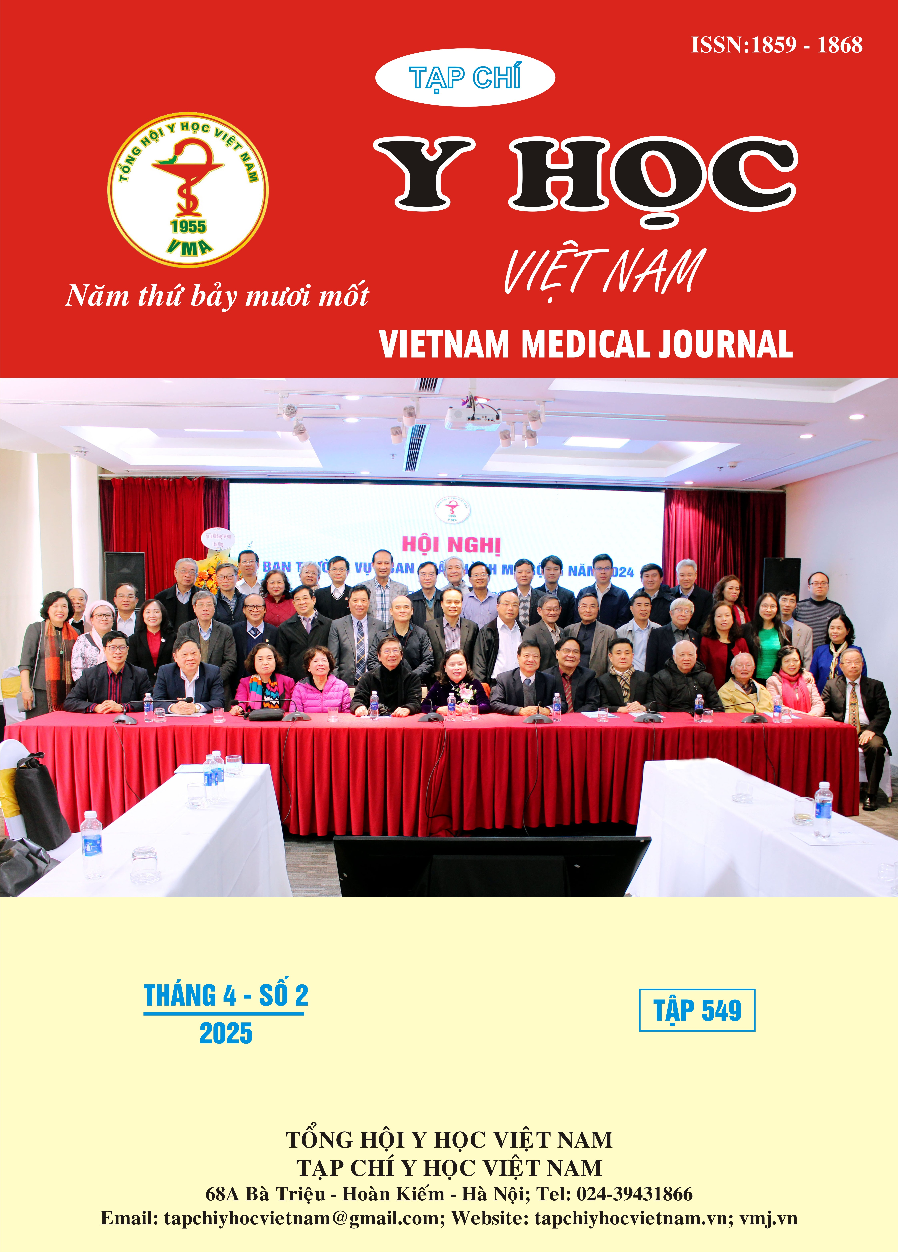KHẢO SÁT TUÂN THỦ ĐIỀU TRỊ THUỐC Ở BỆNH NHÂN SUY TIM MẠN TẠI PHÒNG KHÁM SUY TIM, KHOA NỘI TIM MẠCH, BỆNH VIỆN CHỢ RẪY
Nội dung chính của bài viết
Tóm tắt
Mở đầu: Suy tim là một hội chứng lâm sàng có tỷ lệ tử vong và tỷ lệ mắc bệnh cao, dẫn đến chi phí điều trị cao cho dân số nói chung. Việc tuân thủ kém điều trị làm tăng tỷ lệ tái nhập viện, tỷ lệ mắc bệnh, tỷ lệ tử vong và chi phí chăm sóc sức khỏe. Hầu hết các nghiên cứu về tuân thủ điều trị thuốc của bệnh nhân suy tim mạn đã công bố được tiến hành ở nước ngoài. Dữ liệu về tuân thủ điều trị thuốc ở bệnh nhân suy tim mạn tại Việt Nam còn hạn chế. Mục tiêu: Nghiên cứu này được tiến hành để đánh giá đặc điểm và xác định tỉ lệ tuân thủ điều trị thuốc trên bệnh nhân suy tim mạn tại phòng khám suy tim, khoa Nội Tim Mạch bệnh viện Chợ Rẫy, Việt Nam. Đối tượng: Bệnh nhân được chẩn đoán suy tim đang được điều trị ngoại trú ≥ 1 tháng tại phòng khám suy tim, khoa Nội Tim Mạch bệnh viện Chợ Rẫy từ tháng 09/2024 đến tháng 02/2025. Phương pháp nghiên cứu: Nghiên cứu cắt ngang mô tả. Kết quả: Tổng cộng có 306 người bệnh thỏa tiêu chuẩn tham gia nghiên cứu. Độ tuổi trung bình 60,5 ± 14,9. Phần lớn người tham gia tuổi từ 50 đến 75 tuổi (64,3%), tỉ lệ nam,nữ là 1,5:1, gần 3/5 (56,9%) người bệnh suy tim phân suất tống máu giảm, suy tim NYHA II chiếm 59,2%.Tỉ lệ người bệnh tham gia tuân thủ điều trị thuốc là 96,1%, không tuân thủ điều trị thuốc là 3,9%.Tỉ lệ người bệnh được kê toa đủ 4 thuốc tứ trụ điều trị suy tim là 65,4%, riêng đối với suy tim phân suất tống máu giảm là 74,7%. Hai thuốc được kê toa nhiều nhất SGLT2, chẹn beta giao cảm lần lượt là 91,8% và 94,4%, trong khi ức chế men chuyển rất thấp, chiếm 3,6%. Yếu tố liên quan đến tuân thủ điều trị thuốc là giới tính, dân tộc, tôn giáo, phân độ suy tim theo LVEF, sử dụng BHYT,vấn đề tài chính. Kết luận: Tỉ lệ người bệnh suy tim mạn tuân thủ thuốc điều trị cao (96,1%). Tỉ lệ người bệnh suy tim mạn được kê toa 4 thuốc tứ trụ điều trị suy tim mạn theo hướng dẫn(GDMT) tương đối cao (65,4%), trong đó đối với suy tim phân suất tống máu giảm là khá cao (74,4%). Người bệnh không có bảo hiểm y tế, thời gian mắc suy tim kéo dài, khó khăn về tài chính có mối liên quan với kém tuân thủ điều trị. Nhân viên y tế cần quan tâm đến nhóm người bệnh này.
Chi tiết bài viết
Từ khóa
Tuân thủ điều trị thuốc, suy tim mạn, thang đo tuân thủ điều trị GMAS, Chợ Rẫy
Tài liệu tham khảo
2. Heidenreich PA, Bozkurt B, Aguilar D, et al. 2022 AHA/ACC/HFSA Guideline for the Management of Heart Failure: A Report of the American College of Cardiology/American Heart Association Joint Committee on Clinical Practice Guidelines. Circulation. 2022;145(18):e895-e1032. doi:doi:10.1161/CIR.0000000000001063
3. Silavanich V, Nathisuwan S, Phrommintikul A, Permsuwan U. Relationship of medication adherence and quality of life among heart failure patients. Heart Lung. Mar-Apr 2019;48(2):105-110. doi:10.1016/j.hrtlng.2018.09.009
4. Pallangyo P, Millinga J, Bhalia S, et al. Medication adherence and survival among hospitalized heart failure patients in a tertiary hospital in Tanzania: a prospective cohort study. BMC research notes. 2020;13:1-8.
5. Ale OK, Busari AA, Irokosu ES, Akinyede AA, Usman SO, Olayem SO. Medication nonadherence in Nigerian heart failure patients: A cross sectional study. Journal of Clinical Sciences. 2021;18(3):155-160. doi:10.4103/jcls.jcls_1_21
6. Anh LTQ, Dũng BT, Trâm VTB, et al. 42. Thực trạng tuân thủ điều trị dùng thuốc của người bệnh suy tim tại bệnh viện đại học y dược thành phố hồ chí minh. Tạp chí y học cộng đồng. 2024;65(cđ 7-nckh)
7. Phong PĐ, Hương PTM, Phong ĐV, Quang NN. Thực trạng sử dụng các nhóm thuốc nền tảng trong điều trị suy tim mạn tính có phân suất tống máu giảm tại Khoa khám bệnh-Bệnh viện Bạch Mai. Tạp chí y học Việt Nam. 2024;535(1B)
8. Rezaei S, Vaezi F, Afzal G, Naderi N, Mehralian G. Medication adherence and health literacy in patients with heart failure: a cross-sectional survey in Iran. HLRP: Health Literacy Research and Practice. 2022;6(3):e191-e199.
9. Hoa TTQ. Tuân thủ điều trị của người bệnh suy tim tại khoa Khám bệnh tự nguyện Bệnh viện Tim Hà Nội năm 2022. 2023;


